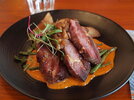I forgot to mention, I would like to discuss what you think is best.
Organic, Grass-fed, and Free-range would be the best, but no producer is offering all 3 together in my findings. So I'm debating which one would be the best choice. On one side, there is the St-Vincent which is Organic and grass-fed, but their price is really high. On the other side, Ferme Rosa is free-range and supplemented with veggies.
Organic, Grass-fed, and Free-range would be the best, but no producer is offering all 3 together in my findings. So I'm debating which one would be the best choice. On one side, there is the St-Vincent which is Organic and grass-fed, but their price is really high. On the other side, Ferme Rosa is free-range and supplemented with veggies.




